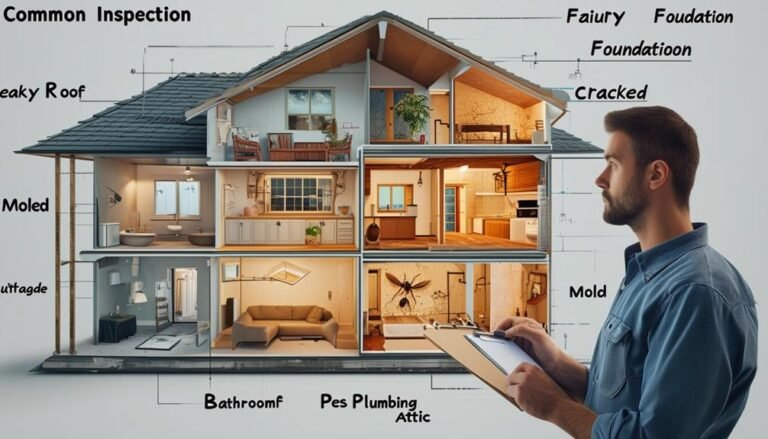When selecting a home inspector or appraiser, prioritize credentials and licensing. Verify their qualifications and make sure they're licensed in your state. Seek professionals with 3-5 years of experience and positive online reviews. Understand their inspection or appraisal process, including duration and focus areas. Opt for those who provide detailed reports, typically 20-50 pages long. Take into account their communication style and availability, making sure they offer prompt responses and flexibility. Local market knowledge is essential for accurate evaluations, so choose someone familiar with your area's real estate landscape. These factors will help you make an informed decision, but there's more to ponder for a thorough selection process.
Credentials and Licensing
When selecting a home inspector or appraiser, you'll want to start by verifying their credentials and licensing to confirm you're working with a qualified professional. For home inspectors, look for certification from reputable organizations such as the American Society of Home Inspectors (ASHI) or the International Association of Certified Home Inspectors (InterNACHI). These associations have strict training requirements and certification processes, ensuring their members meet high standards of expertise.
For appraisers, it's pivotal to verify that they're licensed in your state and have completed the necessary educational requirements. Many qualified appraisers are members of the Appraisal Institute, which indicates a commitment to professional development and adherence to ethical standards.
Insurance coverage is another important factor to keep in mind. A reputable home inspector should carry Errors and Omissions (E&O) insurance, which provides liability protection for both the inspector and you as the client. This coverage safeguards against potential oversights or mistakes in the inspection process.
When evaluating credentials, don't hesitate to ask about the professional's experience in the field. An inspector or appraiser with a proven track record can offer valuable insights and reliable services. You can request references or examples of previous work to gauge their expertise.
Remember that while credentials and licensing are essential, they're just the starting point. You'll also want to take into account factors such as communication style, availability, and the depth of their reports. By thoroughly vetting a home inspector or appraiser's qualifications, you're taking a pivotal step towards ensuring a smooth and informed real estate transaction.
Experience and Reputation
After verifying credentials, you'll want to focus on the experience and reputation of potential home inspectors or appraisers. Industry expertise is vital, so aim for professionals with at least 3-5 years of experience in the field. This guarantees they've encountered a wide range of property types and potential issues, enhancing their ability to provide thorough assessments.
To gauge reputation, start by checking online reviews and ratings. These can offer valuable insights into client satisfaction and the quality of services provided. However, don't solely rely on online feedback. Ask the inspector or appraiser for references from previous clients. Speaking directly with past customers allows you to gather firsthand information about their experiences, the professional's communication style, and the overall value of their services.
Consider the professional's affiliations with industry organizations. For home inspectors, membership in the American Society of Home Inspectors (ASHI) indicates a commitment to high standards and ongoing education. Appraisers affiliated with the Appraisal Institute demonstrate dedication to professional development and ethical practices.
When evaluating experience, inquire about the types of properties they've assessed and any specializations they may have. This information can help you determine if their expertise aligns with your specific needs. Additionally, ask about their reporting methods and turnaround times to ensure they meet your expectations.
Inspection or Appraisal Process

Understanding the inspection or appraisal process will help you prepare for what's ahead and make sure you're receiving a thorough evaluation of the property. Home inspections typically last 2-3 hours, while appraisals take 4-5 hours. Both processes involve in-depth assessments of various aspects of the property.
During a home inspection, the professional will focus on:
- Structural integrity
- Indoor air quality
- Code compliance
- Heating, cooling, plumbing, and electrical systems
Appraisers, on the other hand, concentrate on determining the property's market value. They'll consider factors such as lot size, exterior condition, construction materials, and comparable sales in the area.
When scheduling an inspection or appraisal, be aware of potential scheduling conflicts. These professionals often have busy calendars, so it's essential to book in advance. Cost considerations should also be factored into your decision-making process. While prices vary, remember that investing in a thorough evaluation can save you money in the long run.
Some inspectors and appraisers offer specialized services that utilize advanced technology. These may include thermal imaging for energy efficiency assessments or drone inspections for hard-to-reach areas. Such services can provide more detailed insights into the property's condition or value.
Both inspectors and appraisers will provide detailed reports on their findings. These reports are essential for buyers and sellers, as they can influence home value and potential negotiations. By understanding the inspection or appraisal process, you'll be better equipped to interpret these reports and make informed decisions about the property.
Report Quality and Detail
In the realm of home inspections and evaluations, the quality and detail of the final report can make or break your decision-making process. When selecting a home inspector or appraiser, it's essential to prioritize professionals who deliver thorough, well-structured reports that clearly explain their findings.
For home inspections, look for reports that range from 20 to 50 pages in length. These documents should cover all aspects of the property, providing you with a detailed understanding of its condition. A quality report format enhances readability, allowing you to easily navigate through different sections and comprehend the information presented. Data accuracy and completeness are paramount, as you'll rely on this information to make informed decisions about the property.
Similarly, when choosing an appraiser, seek out professionals who offer detailed reports that outline the property's value and the factors considered in their assessment. These comprehensive appraisal reports are essential for buyers, sellers, and lenders alike, as they provide a solid foundation for financial decisions related to the property.
Communication and Availability

While a detailed report is essential, equally important is your ability to communicate effectively with the home inspector or appraiser throughout the process. When selecting a professional for your home inspection or appraisal, consider their communication style and availability. A responsive inspector or appraiser can greatly enhance your experience and provide you with timely updates and information.
Look for professionals who demonstrate:
- Scheduling flexibility
- Prompt response times
- Clear and concise communication
- Willingness to address your concerns
Scheduling flexibility is vital, as you'll want someone who can accommodate your timeline. A professional with good response time will keep you informed and minimize delays in the process. Clear communication ensures you understand the findings and can make informed decisions. Additionally, choose someone willing to address your concerns, as this indicates their commitment to your satisfaction.
When evaluating potential inspectors or appraisers, ask about their preferred communication methods. Some may be more accessible via phone, while others prefer email or in-person meetings. Guarantee their communication style aligns with your preferences for a smooth experience.
Consider requesting references or reading reviews to gauge the professional's communication skills and availability. Past clients can provide valuable insights into the inspector or appraiser's responsiveness and ability to explain complex issues clearly.
Local Market Knowledge
Local market wisdom empowers home inspectors and appraisers to provide you with more accurate and insightful evaluations of a property's condition and value. When choosing a professional for your home inspection or appraisal, it's essential to select someone with a deep understanding of the local real estate landscape.
An inspector or appraiser well-versed in market trends and analysis can offer you valuable insights that go beyond surface-level observations. They'll be able to contextualize their findings within the broader scope of the local market, giving you a more inclusive picture of the property's worth and potential. This expertise allows them to identify area-specific factors that may impact the property's value or condition, which an outsider might overlook.
Furthermore, professionals with local knowledge can provide more accurate neighborhood dynamics evaluations. They'll understand the nuances of different areas, including school district quality, proximity to amenities, and future development plans. This information is essential for making informed decisions about a property's long-term value and suitability for your needs.
When interviewing potential inspectors or appraisers, ask about their experience in your specific area. Inquire about their familiarity with local building codes, common issues in nearby properties, and recent market trends. A professional who can demonstrate in-depth local knowledge will likely provide you with a more thorough and accurate assessment, ultimately helping you make better-informed decisions in your real estate transactions.
Conclusion
You've now armed yourself with the knowledge to select a competent home inspector or appraiser. Ironically, the process of choosing these professionals can be as thorough as their own inspections. Don't cut corners; your diligence now will pay dividends later. Remember, a skilled inspector or appraiser isn't just examining a property—they're safeguarding your investment. By following these guidelines, you're not just picking a service provider; you're choosing a partner in your real estate journey.


















